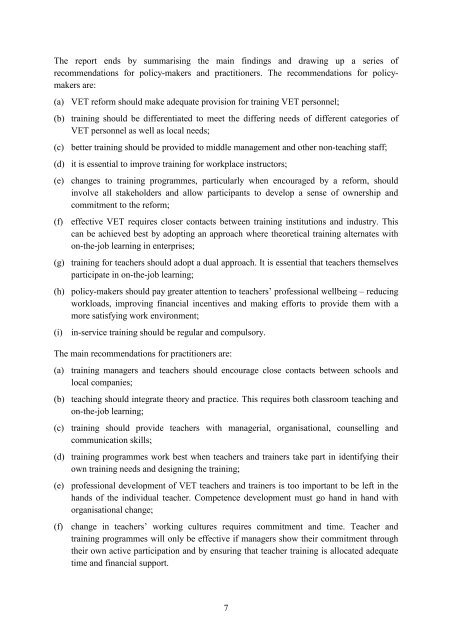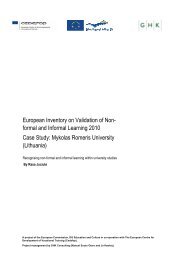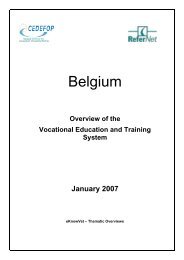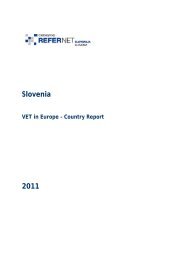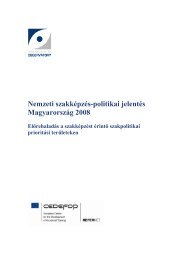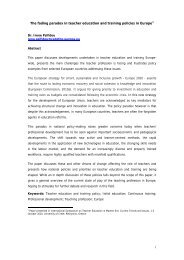PROFF – Professionalisation of VET teachers for the future - Europa
PROFF – Professionalisation of VET teachers for the future - Europa
PROFF – Professionalisation of VET teachers for the future - Europa
Create successful ePaper yourself
Turn your PDF publications into a flip-book with our unique Google optimized e-Paper software.
The report ends by summarising <strong>the</strong> main findings and drawing up a series <strong>of</strong>recommendations <strong>for</strong> policy-makers and practitioners. The recommendations <strong>for</strong> policymakersare:(a) <strong>VET</strong> re<strong>for</strong>m should make adequate provision <strong>for</strong> training <strong>VET</strong> personnel;(b) training should be differentiated to meet <strong>the</strong> differing needs <strong>of</strong> different categories <strong>of</strong><strong>VET</strong> personnel as well as local needs;(c) better training should be provided to middle management and o<strong>the</strong>r non-teaching staff;(d) it is essential to improve training <strong>for</strong> workplace instructors;(e) changes to training programmes, particularly when encouraged by a re<strong>for</strong>m, shouldinvolve all stakeholders and allow participants to develop a sense <strong>of</strong> ownership andcommitment to <strong>the</strong> re<strong>for</strong>m;(f) effective <strong>VET</strong> requires closer contacts between training institutions and industry. Thiscan be achieved best by adopting an approach where <strong>the</strong>oretical training alternates withon-<strong>the</strong>-job learning in enterprises;(g) training <strong>for</strong> <strong>teachers</strong> should adopt a dual approach. It is essential that <strong>teachers</strong> <strong>the</strong>mselvesparticipate in on-<strong>the</strong>-job learning;(h) policy-makers should pay greater attention to <strong>teachers</strong>’ pr<strong>of</strong>essional wellbeing <strong>–</strong> reducingworkloads, improving financial incentives and making ef<strong>for</strong>ts to provide <strong>the</strong>m with amore satisfying work environment;(i) in-service training should be regular and compulsory.The main recommendations <strong>for</strong> practitioners are:(a) training managers and <strong>teachers</strong> should encourage close contacts between schools andlocal companies;(b) teaching should integrate <strong>the</strong>ory and practice. This requires both classroom teaching andon-<strong>the</strong>-job learning;(c) training should provide <strong>teachers</strong> with managerial, organisational, counselling andcommunication skills;(d) training programmes work best when <strong>teachers</strong> and trainers take part in identifying <strong>the</strong>irown training needs and designing <strong>the</strong> training;(e) pr<strong>of</strong>essional development <strong>of</strong> <strong>VET</strong> <strong>teachers</strong> and trainers is too important to be left in <strong>the</strong>hands <strong>of</strong> <strong>the</strong> individual teacher. Competence development must go hand in hand withorganisational change;(f) change in <strong>teachers</strong>’ working cultures requires commitment and time. Teacher andtraining programmes will only be effective if managers show <strong>the</strong>ir commitment through<strong>the</strong>ir own active participation and by ensuring that teacher training is allocated adequatetime and financial support.7


